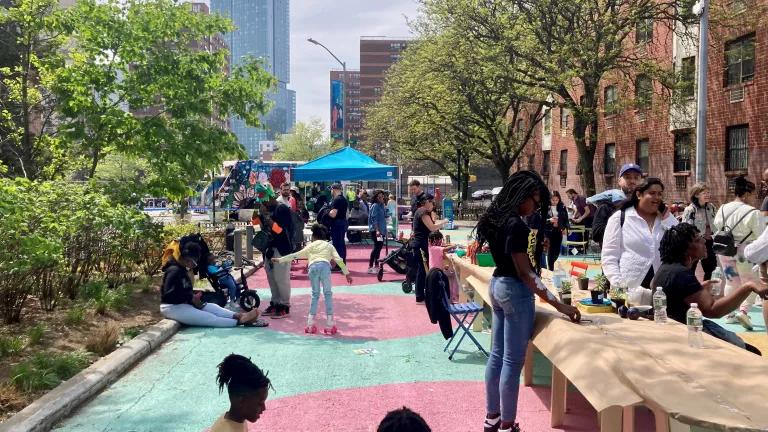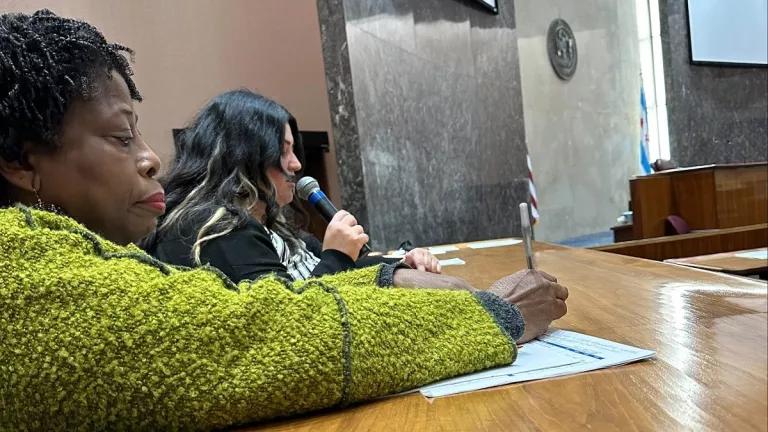Final Five Cities Join Bloomberg Climate Challenge
The Bloomberg American Cities Climate Challenge—a $70 million dollar program helping a total of 25 cities nationwide step up their efforts to tackle climate change—announced today its final five winning cities: Austin, San Antonio, Albuquerque, Denver and Orlando.
The challenge recognizes that cities are uniquely motivated to help tackle climate change: residents are on the frontlines of climate change and bear the brunt of its effects, from heat waves to increasingly frequent flood events.
That’s a reality that two major reports released last year from leading world experts warn will get worse much sooner than expected if we don’t act swiftly and boldly. And with Washington dragging its feet in addressing the problem, local leadership is critical to ensure a better future for our children and grandchildren.
NRDC is proud to join with Bloomberg Philanthropies, Delivery Associates, and partners to support participants in addressing climate pollution from buildings and transportation, which are the two main sources in America’s cities. The U.S. transportation sector alone is responsible for 1.9 billion tons of carbon emissions per year—more than the total emissions worldwide from of all but three countries, according to the U.S. Energy Information Administration.
By making concrete plans to cut climate change pollution, the cities chosen to participate in Bloomberg’s American Cities Climate Challenge will improve public health, economic opportunity, and overall quality of life. Projects each city will pursue include:
Austin
- Reducing energy use in municipal buildings – Austin will lead by example in building efficiency, retrofitting and retro-commissioning buildings with high energy use. By 2020, the city will retro-commission the 10 municipal buildings with the biggest potential for energy savings.
- Promoting commercial rebate program participation – Austin Energy will perform outreach to increase participation in its rebate programs encouraging commercial property owners to reduce their energy use.
- Incentivizing sustainable commuting – Austin is committed to deploying commuter incentives to encourage the use of transportation options with a lower carbon footprint such as walking, biking, and buses.
- Promoting electric vehicle sales – The city will develop educational materials and partner with car dealerships to increase the sale of electric cars.
- Rethinking parking – Austin will implement new parking management and pricing programs to reduce vehicle emissions.
- Embracing technology – Austin will develop a technology platform to increase use of new mobility options and reduce single-occupancy vehicle trips.
San Antonio
- Transitioning to renewable energy – The city will transition away from fossil fuels, with the goal of meeting 100 percent of electricity for municipal operations from renewable sources. San Antonio will work with CPS Energy to procure electricity from renewable resources and also develop solar panels on city property.
- Strengthening energy efficiency standards – The city will develop and adopt benchmarking, retro-commissioning, and disclosure requirements to reduce energy use in large commercial and multi-family buildings.
- Developing an electric vehicle network – San Antonio will double the number of public charging stations in the city, replace more than 100 gas-powered city-owned sedans with electric cars, and purchase eight new electric buses.
- Expanding public transit – The city will modernize its bus transit network with real-time arrival information, off-board fare collection at busy stops, and ten miles of new bus-only lanes. The city will also develop an implementable plan for a modern, multi-modal transportation system aiming to create sustainable commuting options for the one million new residents San Antonio is projected to add over the next 20 years.
Albuquerque
- Electrifying the municipal fleet– Albuquerque will transition its light-duty vehicle fleet from gas and diesel to electric. This switch will help set an example for public adoption of electric cars and provide a catalyst for the creation of a citywide charging network.
- Transitioning to clean energy – The city will work with the local electricity provider to develop the infrastructure necessary to achieve 100 percent energy use from renewable resources by 2030.
- Reducing energy use in municipal buildings – The city will conduct deep energy efficiency retrofitting and retro-commissioning in city-owned buildings, with the goal of reducing energy use by 65 percent.
Orlando
- Electrifying city vehicles – Orlando will begin transitioning the city fleet to electric, with the goal of 5.5 percent of all city vehicles and 10 percent of buses electric by 2020. The city will also upgrade fleet facilities to achieve net-zero carbon emissions this year.
- Encouraging electric vehicle adoption – Orlando will promote electric vehicle adoption by providing financial incentives to consumers, adding more than 50 electric vehicles to rental fleets through innovative and strategic partnerships with Drive Electric Orlando and the Orlando Utilities Commission, and installing 150 charging stations throughout the city by 2020.
- Piloting an energy efficient building program – The Driving Efficient Energy Performance (DEEP) program will reduce energy use by 25 percent in 20 pilot buildings by 2020.
- Promoting community solar projects – The city will conduct outreach to residents to sign on to new community solar and other renewable energy projects, with the goal of getting 1,500 subscribers to community solar and 500 households to participate in the Collective Solar program across the Orlando Utility Commission customer base by 2020.
Denver
- Transforming the electric vehicle market – Denver will encourage the sale of electric cars by expanding its Pass Gas education program, with the goal of 1,000 people to test drive electric cars by 2020. The city will also deploy financial incentives to encourage utilities to expand electric vehicle charging infrastructure.
- Increasing bus service and use – The city will add two to four corridors of bus service operating every 15 minutes or less and expand commuter incentive programs to increase ridership.
- Redesigning streets for safety – The city will redesign two to four streets with new bike lanes and sidewalks to promote safety for people walking and riding bicycles.
- Planning for a zero-emission future – Denver will develop a program to eliminate net carbon emissions its building sector by 2035.
Our planet cannot wait for us to act on climate change. All 25 Bloomberg American Cities Climate Challenge winners are taking a bold stand on emissions reductions. We look forward to helping these cities pave the way.
This blog was co-authored with Rabi Abonour, Research Associate, Transportation, American Cities Climate Challenge.



